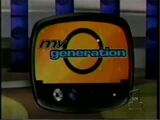| Host | |
| Craig Shoemaker | |
| Announcer | |
| Lindsay Stoddart | |
| Broadcast | |
| VH1: 3/8/1998 – 9/1998 | |
| Packager | |
| VH1 | |
OPENING SPIEL: "From the virutal VH1 Studios… (Insert two names, occupations, and Graduating Class of the Year). Today, these two generations will face-off to see who knows more about the music that rocks their world. Welcome to VH1's Rock and Roll Showdown, I'm talking about My Generation. And now, here's your host, Craig Shoemaker!"
My Generation was a musical game show where the songs and music videos come from different generations.
Gameplay[]
Two pairs of players from different graduation years – anywhere from 1960 to 1995, typically 10-20 years apart – competed in a game of musical knowledge for a chance to win a trip.
Main Game[]
In the first two rounds, both teams faced a game board of five categories of six questions each (three from one team's generation, and three from the other). Each contestant was equipped with their own buzzer to use to try & answer the question. All questions featured either a music video, a picture, or a skit (ala Remote Control). Correct answers earned points, but incorrect answers lost points. The points doubled for each new question.
Round 1: The Singles Round[]
The winners of a coin toss chose the first set. The first question in a set was asked as a toss-up open for all players to buzz-in individually. A correct answer awarded 50 points and the right to play a follow-up question for 100 points if desired, directed at the partner of the player who had answered the toss-up. If the partner answered the follow-up correctly, the team was asked a 200-point bonus question. A miss on any question passed control to the opponents and allowed them to answer if they chose; missing the toss-up or follow-up also deducted the relevant amount from a team's score.
A question set went out of play as soon as any of the following occurred:
- Both teams missed the same question
- One team missed a question and their opponents chose not to attempt it
- The team that scored on the toss-up declined the follow-up
- Different teams answered the toss-up and follow-up correctly
- The bonus question was asked
The team in control then chose a new set. The round continued until time ran out or all 10 question sets had been played, whichever came first.
A bonus prize was awarded to any team that chose a question set from their opponents' generation and answered the toss-up correctly (referred to as "crossing generations").
Round 2: The CD Round[]
In this round, all point values doubled and the trailing team chose first from a new board of categories. Each team was given one Dedication to use during this round, which allowed them to force their opponents to answer a question meant for them. If the opponents missed, they were penalized appropriately and the team using the Dedication also received the points at stake; if the opponents answered correctly, they scored for the question instead.
Round 3: The Speed Round[]
The host read the combined names of two bands or songs (one from each team's generation), each with the same word missing, and the teams had to buzz-in and give the word. (Example: "C+C Roxy Factory" would lead to MUSIC, for C+C Music Factory and Roxy Music.) A correct answer awarded 200 points, while a miss deducted 200. The time limit for this round was variously 30 or 45 seconds; when time ran out, the team in the lead won a prize and advanced to the Time Warp bonus round.
In some episodes, the teams were shown the names of two bands and had to give the title of a song released by both of them, or had to identify which of two similarly named bands recorded a particular song.
Bonus Round: Time Warp[]
The "My Generation Time Warp" was played similar to Password's Lightning Round & Pyramid's Winner Circle. One team member was shown the name of one of 10 bands and had to give one clue of no more than two words to get their partner to guess it. Illegal clues (more than two words, using any portion of the name, etc.) forfeited that band. Bands started in the winning team's generation and moved gradually toward that of their defeated opponents. Either team member could pass on a band, and multiple guesses were allowed. The team won the grand prize for identifying seven bands in 60 seconds, with smaller prizes awarded for each correct guess.
Studio[]
Stage 1, Production Group Studios, Hollywood, CA
Trivia[]
The show was taped on a virtual set.
Unlike other game shows, when Craig reads a question, he uses the CD Album to open the cover.
Due to the show's similar format and emphasis on music, it is considered to be a semi-revival of the 1969 ABC series The Generation Gap.
